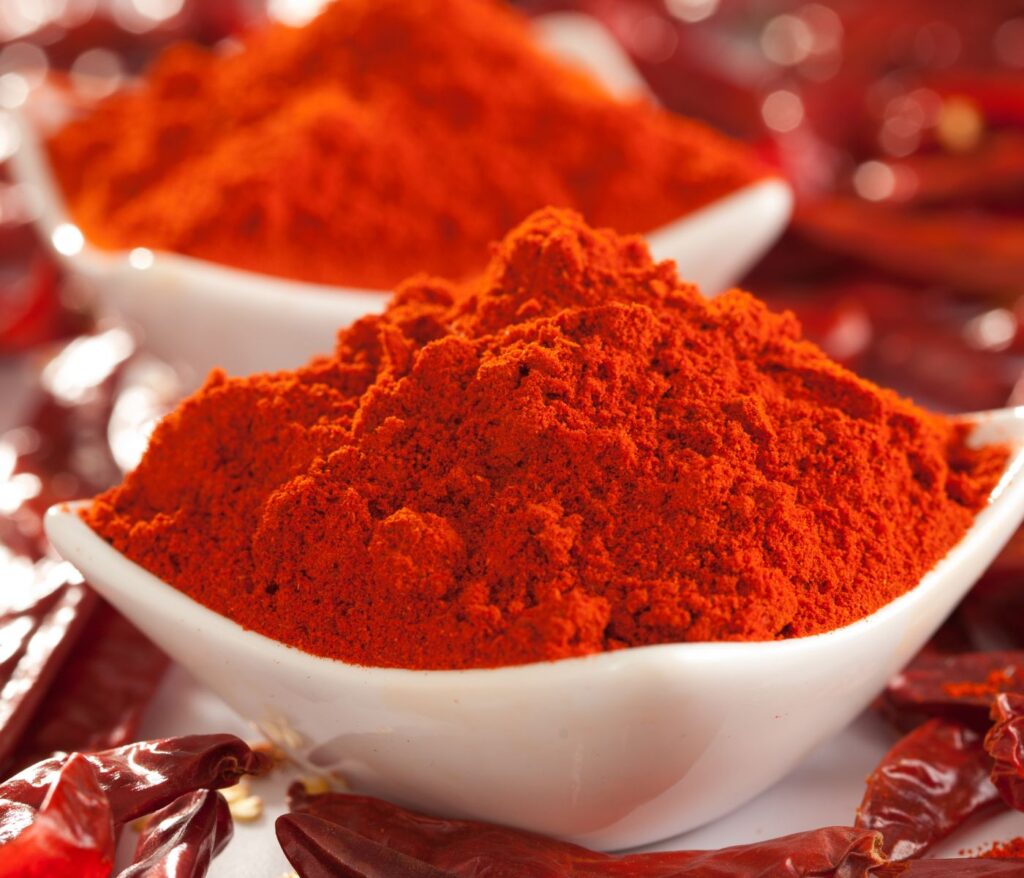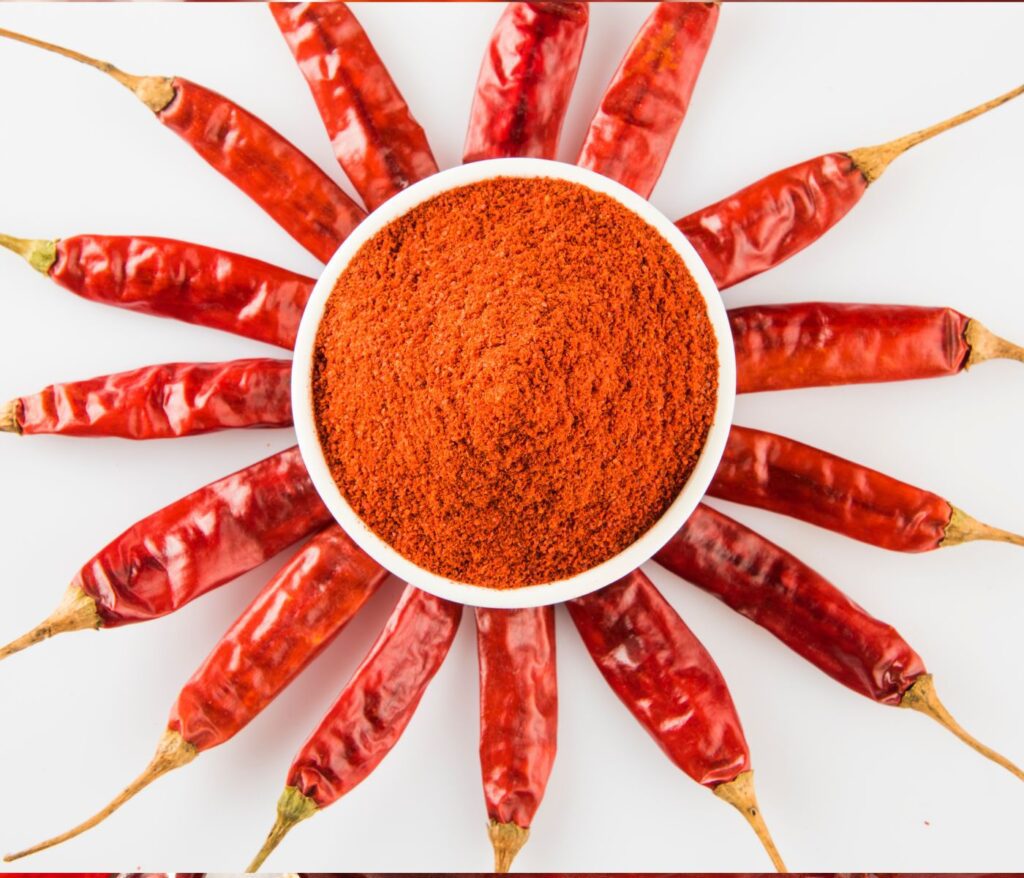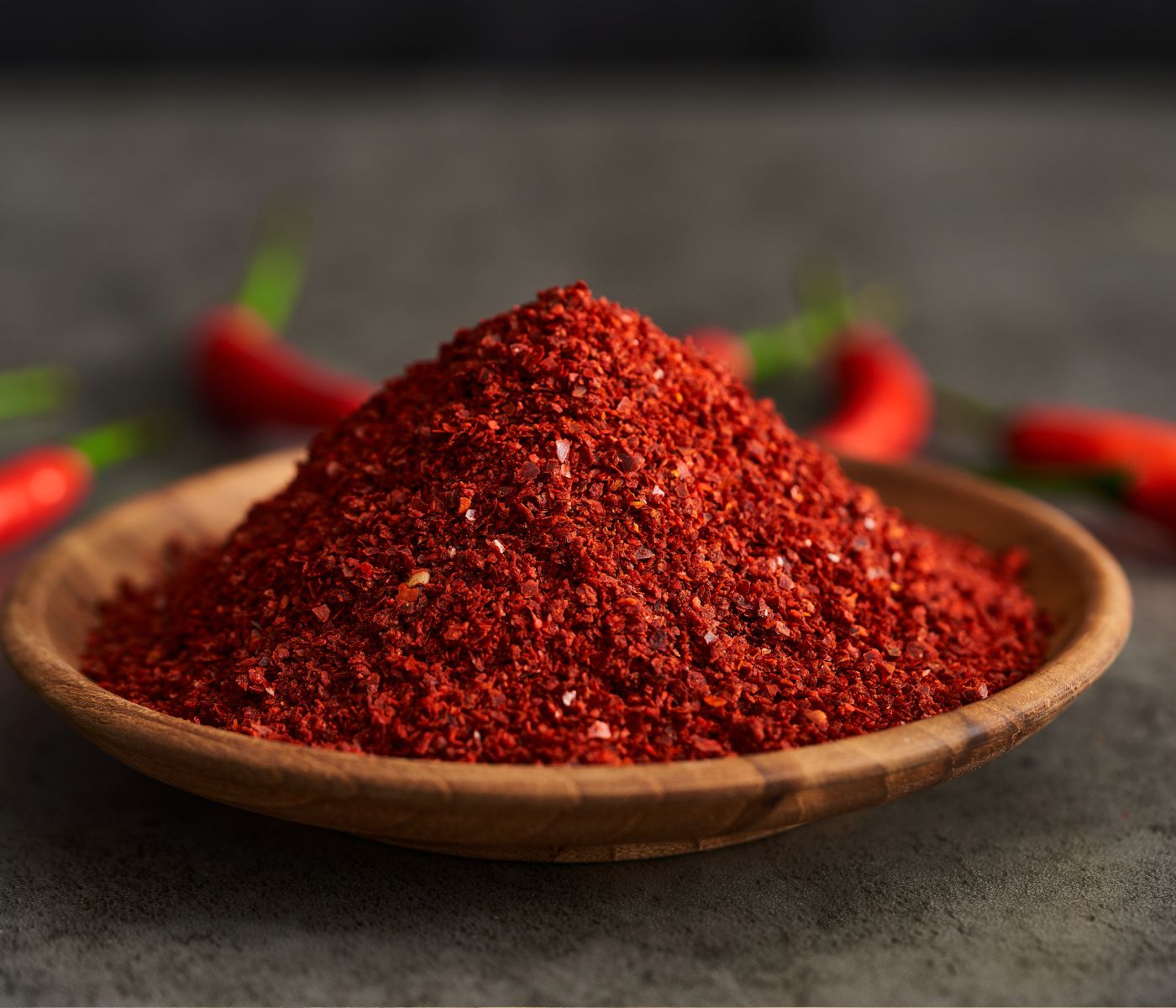We all care a lot about our pets, right? Making sure they’re healthy and happy is a big deal. As good pet owners, we always want to give them the right food.
But here’s the tricky part – figuring out what’s safe and what’s not can be a bit confusing, especially regarding everyday kitchen stuff.
So, today, we will discuss a hot topic: Is chili powder okay for our dogs? Let’s check out the good and not-so-good things about it, ensuring our furry pals stay in tip-top shape.
Ready? Let’s dive into the spicy world of chili powder and our doggy friends!
What is Chili Powder?

Chili powder is a spice blend made by grinding dried chili peppers, often mixed with spices like cumin and garlic powder.
Chili powder can vary from mild to hot and is used widely in cooking for flavor and heat.
While it enhances human dishes, it poses concerns for dogs due to ingredients like garlic and onions, which are known to be toxic.
To ensure our pets’ safety, we must consult a veterinarian before sharing foods seasoned with chili powder with our canine companions.
Is Chili Powder Bad for Dogs?

Chili powder can be harmful to dogs due to several factors. The primary concern lies in its ingredients, as many commercial chili powder blends contain toxic substances in canines.
Ingredients like garlic and onions, commonly found in these spice mixes, can lead to digestive distress, damage to red blood cells, and even more severe health issues.
Dogs have a different digestive system and sensitivity to certain compounds than humans, making them more susceptible to the adverse effects of these ingredients.
Additionally, the spiciness of chili powder, attributed to the presence of capsaicin in chili peppers, can cause discomfort and gastrointestinal upset in dogs.
It’s crucial for pet owners to be aware of the potential risks associated with chili powder and to exercise caution, avoiding the inclusion of such spices in their canine companions’ diets to ensure their well-being.
Potential Risks of Chili Powder for Dogs:
1. Spicy Sensitivity:
- Dogs, unlike humans, have different taste buds and digestive systems. Spicy foods can be harsh on their stomachs, leading to digestive distress such as vomiting and diarrhea.
- The active component in chili peppers, capsaicin, can cause discomfort for dogs, making them more sensitive to spicy flavors.
2. Gastrointestinal Upset:
- Chili powder, with its potent mix of spices, can irritate a dog’s gastrointestinal tract. This irritation may result in stomach pain, nausea, and an upset stomach.
- In severe cases, it can lead to inflammation and more serious digestive issues.
3. Allergic Reactions:
- Dogs, like humans, can have allergies to certain foods. The various ingredients in chili powder, such as garlic and onions, are known to be toxic to dogs.
- Consumption of these substances can lead to allergic reactions ranging from mild itching to more severe symptoms like difficulty breathing.
4. Pancreatitis Risk:
- Spicy and high-fat foods, such as chili powder, can increase the risk of pancreatitis in dogs.
- Pancreatitis is a painful and potentially life-threatening inflammation of the pancreas. Symptoms include abdominal pain, vomiting, and lethargy.
5. Salt Content:
- Some commercially available chili powders may contain high salt levels, which can harm dogs.
- Excessive salt intake can lead to sodium ion poisoning, causing symptoms such as increased thirst, vomiting, diarrhea, and, in severe cases, seizures or death.
What Happens if a Dog Eats Chili Powder?
When a dog consumes chilli powder, it can lead to a range of health issues due to the ingredients present in the spice blend. Here’s what happens and what pet owners should be aware of:
- Digestive Distress:
- Chilli powder often contains ingredients like garlic and onions, which are toxic to dogs. Ingesting these substances can lead to digestive distress, causing symptoms such as vomiting, diarrhoea, and abdominal pain. Dogs may exhibit signs of discomfort as their digestive systems react to the irritants in the spice.
- Toxicity Concerns:
- Garlic and onions contain compounds that can damage a dog’s red blood cells, leading to a condition known as hemolytic anaemia. This can result in symptoms like lethargy, weakness, pale gums, and even more severe complications. The level of toxicity depends on the amount of chilli powder ingested and the size of the dog.
- Spiciness and Discomfort:
- The active component in chilli peppers, capsaicin, is responsible for the spice level. Dogs are generally more sensitive to spicy flavours than humans, and ingesting chilli powder can cause discomfort, excessive drooling, and pawing at the mouth.
- Gastrointestinal Inflammation:
- The combination of various spices in chilli powder can irritate the dog’s gastrointestinal tract, leading to inflammation. This inflammation can exacerbate digestive issues and may result in a prolonged recovery period.
- Dehydration:
- The spiciness of chilli powder can lead to increased thirst, potentially causing dehydration. Dogs may drink more water than usual to counteract the effects of the spice.
- Difficulty Breathing (In Severe Cases):
- In extreme cases, especially if a large amount of chilli powder is given to dogs, dogs may experience difficulty breathing. It is a critical situation that requires immediate veterinary attention.
What to do if your Dog Eats Chili Powder
If your dog accidentally consumes chili powder, it’s essential to take prompt action to ensure their well-being. Here’s what you should do:
- Contact Your Veterinarian: The first and most crucial step is to contact your veterinarian immediately.
- Provide details about the amount of chili powder ingested, the specific ingredients in the blend, and your dog’s size and breed.
- This information will help the veterinarian assess the potential risks and provide guidance.
- Monitor for Symptoms: Keep a close eye on your dog for any signs of distress. Symptoms may include vomiting, diarrhea, lethargy, excessive drooling, or abdominal pain.
- If you observe any unusual behavior, it’s crucial to report this information to the veterinarian.
- Do Not Induce Vomiting Without Professional Advice: While inducing vomiting may be recommended in some poisoning cases, it’s crucial to consult your veterinarian before attempting this at home.
- Certain substances in chili powder may exacerbate the situation, and the vet will provide specific instructions based on your dog’s condition.
- Provide Water: Encourage your dog to drink water to help dilute the effects of the chili powder and prevent dehydration.
- However, do not force them to drink, as this could lead to further complications.
- Avoid Home Remedies Without Veterinary Approval: Refrain from administering any home remedies or medications without consulting your veterinarian.
- Some common human interventions may not be suitable or safe for dogs and could worsen the situation.
- Visit the Veterinarian Immediately: If advised by your veterinarian, take your dog to the clinic or emergency animal hospital promptly.
- Quick professional intervention can make a significant difference in the outcome.
- Bring the Chili Powder Container: If possible, bring the container or packaging of the chili powder with you to the veterinarian.
- This will help them identify specific ingredients and tailor the treatment accordingly.
Remember, the key to handling a situation where your dog has ingested chili powder is swift action and professional guidance.
Always prioritize your dog’s safety and seek veterinary assistance for an accurate assessment and appropriate treatment.
Does Chili Powder Kill Dogs
While chili powder itself may not directly cause death in dogs, it poses a serious threat due to toxic ingredients like garlic and onions.
Ingesting these substances can lead to conditions such as hemolytic anemia, which, if untreated, can be fatal.
The severity depends on factors like the amount consumed, the dog’s size, and the specific spice blend. Symptoms include vomiting, diarrhea, lethargy, and difficulty breathing.
Immediate veterinary attention is crucial to mitigate risks and ensure the well-being of the dog.
Prevention, such as keeping spicy foods out of reach, is key to safeguarding our canine companions.
FAQS
Q: Can you feed a dog chili?
A: Feeding dogs chili is not recommended due to potential health risks associated with ingredients like onions, garlic, and spices.
These can cause digestive distress and, in severe cases, lead to conditions like hemolytic anemia.
Q: How much chili powder is toxic to dogs?
A: The toxicity of chili powder to dogs varies based on factors like the dog’s size, breed, and the specific ingredients in the spice. There isn’t a precise amount universally considered toxic.
Even small quantities, especially if containing harmful ingredients like garlic or onions, can pose risks.
Q: Is chilli sauce bad for dogs?
A: Yes, chili sauce is generally bad for dogs. It often contains ingredients like onions, garlic, spices, and potentially high levels of salt, all of which can be harmful to dogs.
Conclusion
it is strongly advised against allowing dogs to consume chili powder due to the potential risks associated with toxic ingredients like garlic and onions. The spice’s spiciness can also cause discomfort.
Prioritizing a safe and balanced diet, consulting with veterinarians, and avoiding potentially harmful substances are key practices for responsible pet ownership.
In the case of chili powder, prevention is crucial to safeguard the health and well-being of our canine companions.
